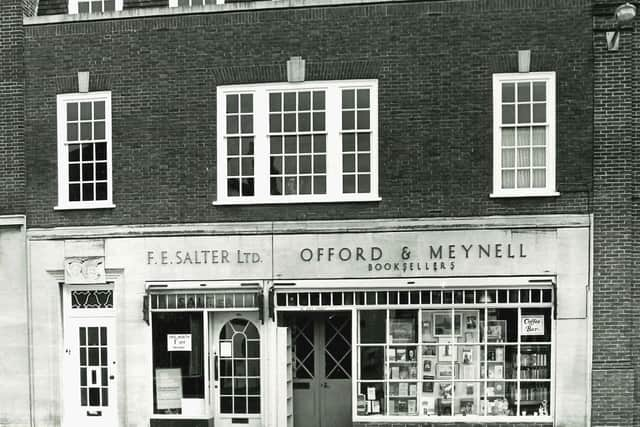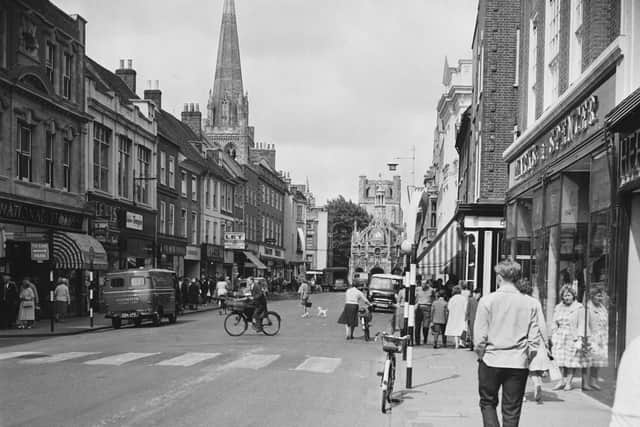Chichester shops in the 1960s: Remembering wonders of Offord & Meynell Booksellers
and live on Freeview channel 276
Charles Offord and Vivian Meynell had been colleagues in the Royal Army Medical Corps during the war, serving in Crete, Egypt, India, Burma and elsewhere. On demobilisation, they decided to pool their resources and set up in business together, and after searching southern England from Canterbury to Torquay for suitable premises, they settled for Chichester.
The shop they found, just along from the Shippam’s factory, belonged to the Dean and Chapter and had served as a wartime forces canteen. Their bookshop opened in 1946.
Advertisement
Hide AdAdvertisement
Hide AdMeynell came from a literary family. His grandparents were Wilfrid and Alice Meynell, both poets; his uncle was Sir Francis Meynell, founder of the Nonesuch Press; the biographer Viola Meynell was a cousin.


Wilfrid, who visited the new shop aged 95, owned an 80-acre estate at Greatham, between Pulborough and Amberley, where leading writers often stayed. D.H. Lawrence had stayed there in 1915, once walking over the Downs to Chichester, on other occasions visiting Bognor and Littlehampton. His short story England My England, inspired by his stay, upset the Meynells.
Although Offord soon dropped out to become a farmer and beekeeper, the name above the shop remained unchanged.
In addition to books, Meynell sold china and prints and in 1954 it became the first bookshop to install a coffee bar. It was the Italian coffee and Patsy Meynell’s sandwiches that attracted a whole new clientele.
Advertisement
Hide AdAdvertisement
Hide AdWhen the Festival Theatre opened, the Minerva Studios in nearby Eastgate Square were used for rehearsals and eminent thespians – Michael Redgrave, Fenella Fielding and the like – would drop in for coffee and gossip.


As a schoolboy in the early 1960s, I would scan the outside shelves for something I could afford, then venture in to pay, having to reach past the celebrities perched on the barstools in a fug of Craven A and espresso fumes in order to do so.
I can still hear their high-cultural voices, the joshing and merriment – “Vivian, when are you going to do something about that ghastly …”, “These croissants are delicious, Patsy, did you have them flown in …”, “Larry wants me to wear a toga but I’m blowed if I …” Mrs Meynell would twinkle at me as she took my coin.
Literati such as Christopher Fry, John Betjeman, Bertrand Russell and A.E. Coppard were among other visitors.
Advertisement
Hide AdAdvertisement
Hide AdGraham Greene, on one of his tours of provincial bookshops (he also visited the Chichester Bookshop in South Street), walked in one day and noticed a copy of one of his early novels , probably The Name of Action or Rumour at Nightfall, priced at £10.


"If I could afford it, I would have it from you and burn it,” he told Meynell. He later returned, only to learn it had been sold.
I still possess some of my own purchases from this shop. My copy of A.C. Bradley’s Shakespearean Tragedy (1905) bears the bookplate of Lord and Lady Gorell, and a little research reveals that Lord Gorell died at Arundel in 1963, so I guess Meynell had acquired his library.
A 1933 edition of T.S. Eliot, Edward Marsh’s translation of the Odes of Horace (1943) and the Falcon Press edition of Shakespeare’s Sonnets (1948) were also bought here. Meynell complimented me when I splashed out 12 shillings and sixpence (his pencil price is still present) on an 1853 four-volume set of Alexander Pope.
Advertisement
Hide AdAdvertisement
Hide AdWith three children to support, Viv Meynell wore other hats than those of bookman and barista. In 1956, he became the Chichester correspondent for the West Sussex Gazette, and later superintendent registrar of births, deaths and marriages. There was a basement office to which he would descend, apparently stocked with reference works – he once obligingly looked something up for my mother.
It was a sad day for the local cultural scene when increased overheads forced Meynell to close the shop in 1976 but he moved not far away, to smaller first-floor premises at 11 The Hornet.
Here, a trade magazine reported in 1978: “There are some 10,000 books on display, all chosen as being well worth their shelf space. It is undoubtedly one of the best of non-specialist bookshops and browsing there is a pleasure; but how one misses the hot coffee of the past.”
Viv Meynell continued trading until 1985 when, aged 69, he decided to call it a day and retired to his home at Birdham.